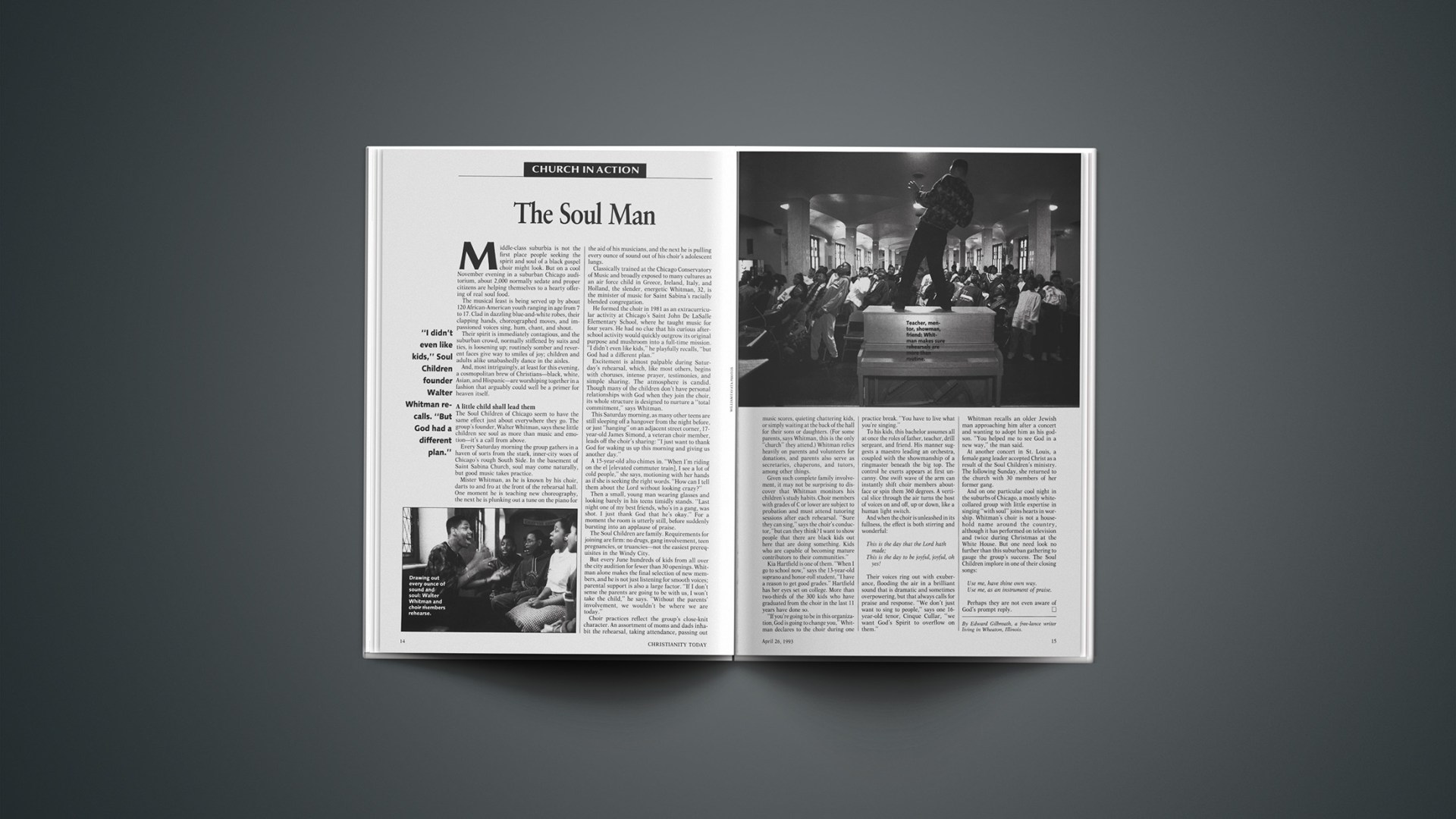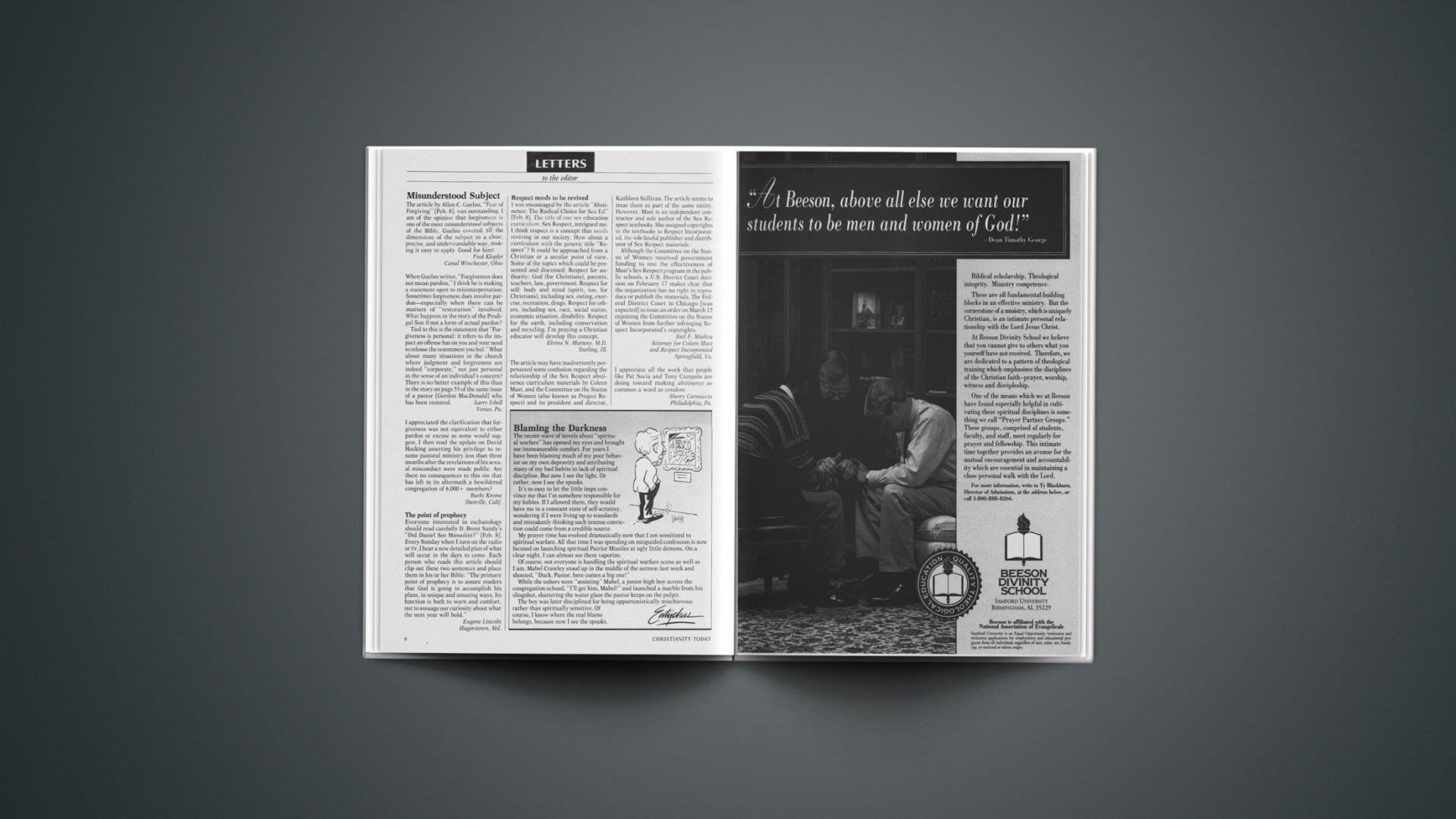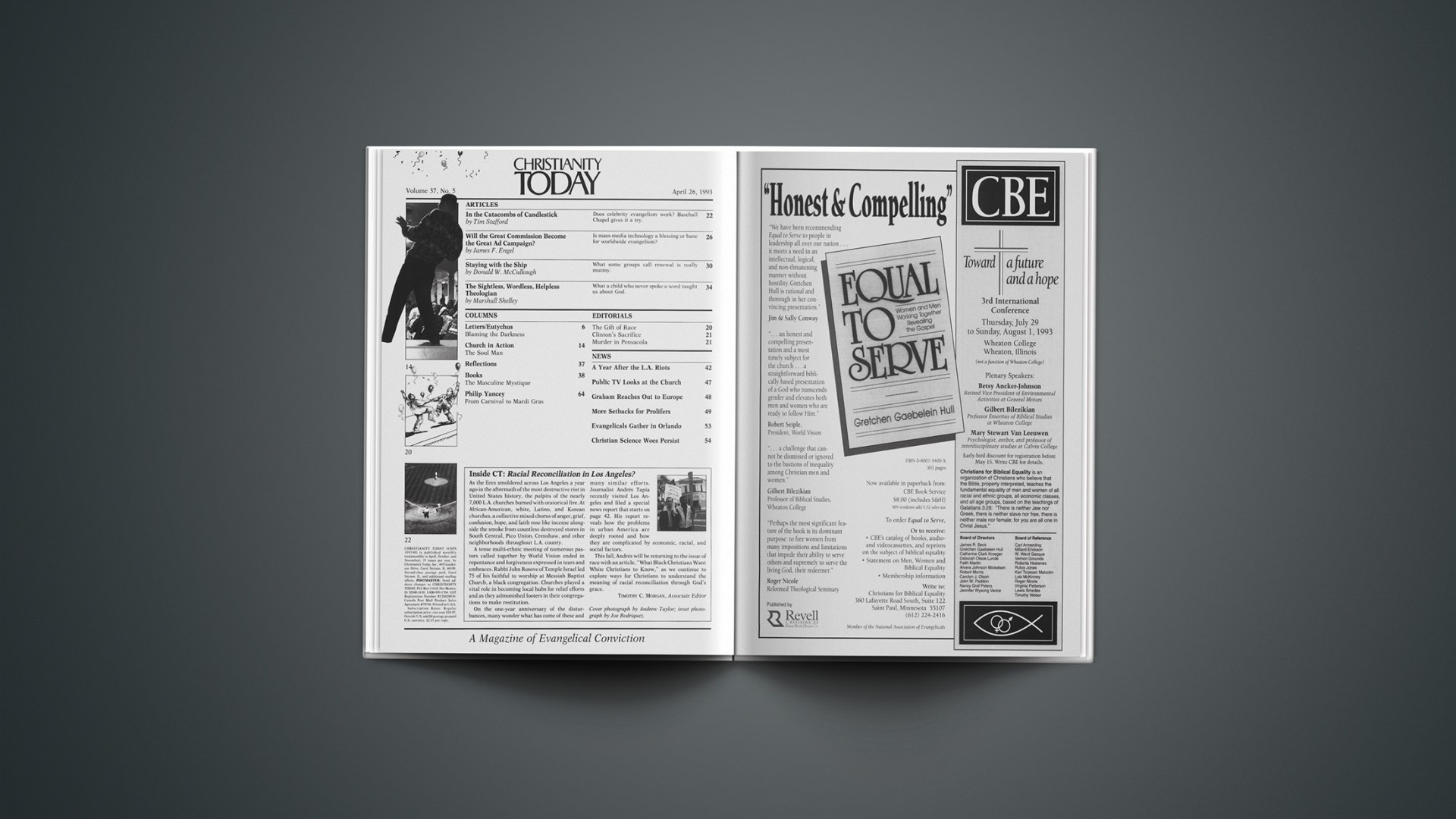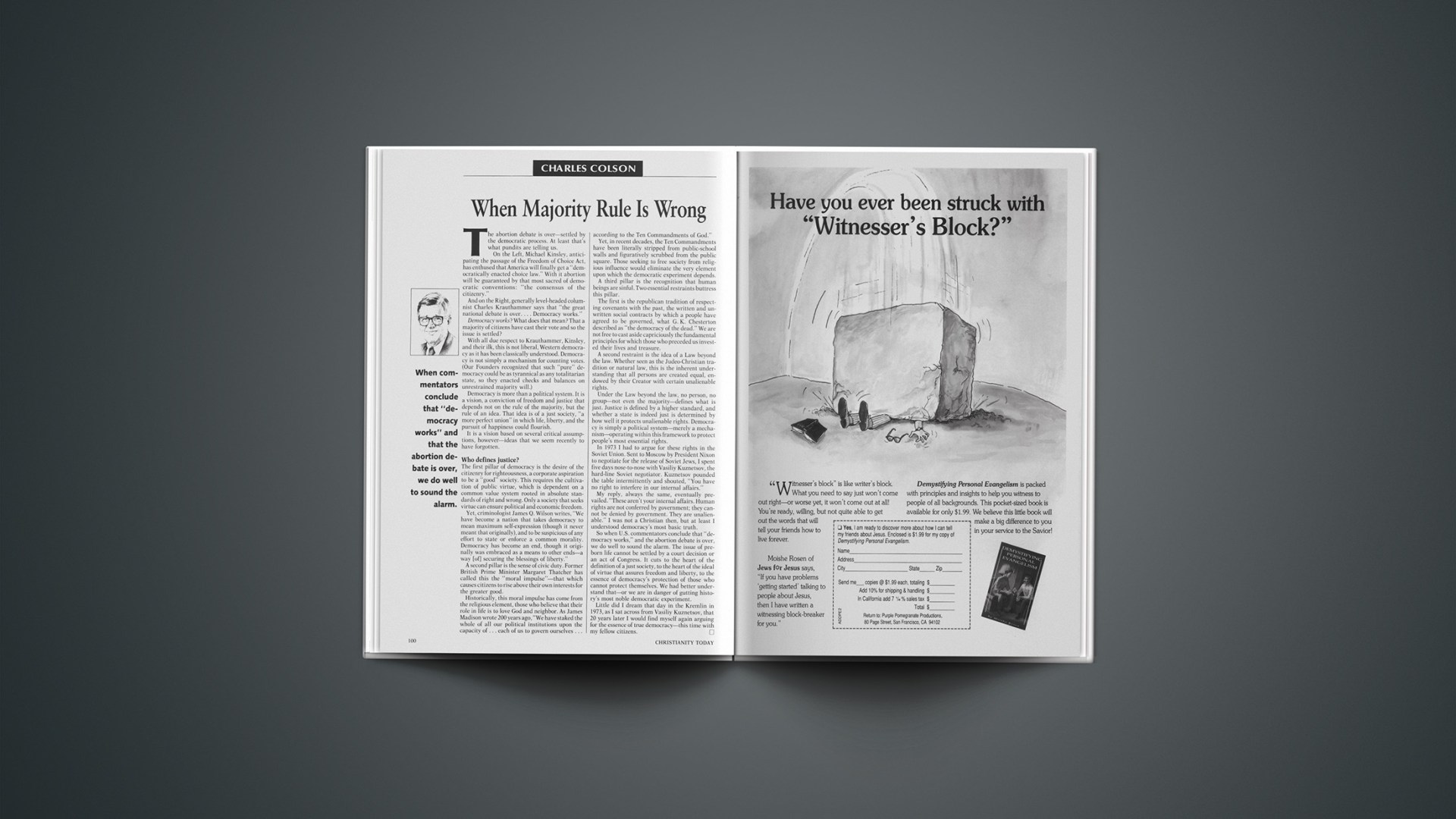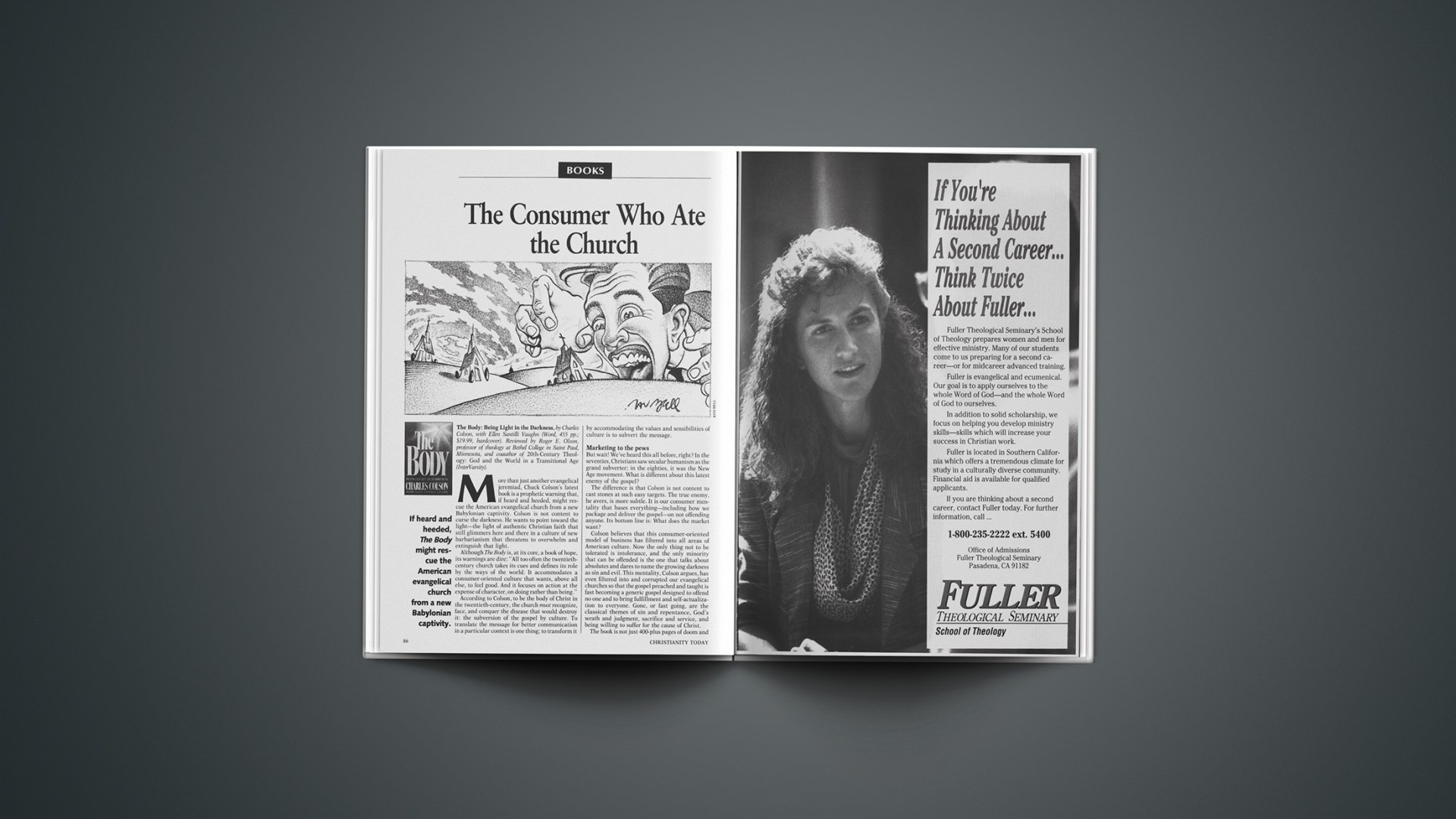If a theologian is one who throws light on the nature of God, one of the most effective theologians I’ve ever met was a child who never spoke a word.
When Mandy was born, the first utterance by the attending physician was “uh-oh.” Then, “We need to measure that head.”
To me, the proud father, this baby daughter looked as normal as our previous two. But to a neonatologist’s well-calibrated eye, the head seemed small. And he was right. Instead of a normal 35-cm circumference, Mandy’s checked in at 31 cm.
We soon learned that Mandy’s condition was called microcephaly (small brain), and that it might cause some mental limitations. Over the next few months, we realized the severity of those limits. Mandy faced severe and profound retardation.
At first, we prayed that Mandy would develop some skills. But my wife, Susan, and I eventually had to accept the implications: Mandy would never talk, walk, sit up, or use her hands. She suffered frequent seizures. Cataracts had to be surgically removed from her eyes when she was three months old.
At a year-and-a-half, she lost her ability to swallow, so we learned to administer her medications and formula through a tube surgically implanted into her stomach. We never knew if she could see or hear. The only time we saw her respond to stimuli was when she occasionally would visibly relax in a warm bath.
Yet this child that some may have considered an “uh-oh,” a mistake, had an amazing ability to turn people’s thoughts to God and to instill lasting lessons about our heavenly Father:
A GOOD FATHER DOESN’T TREAT ALL HIS CHILDREN ALIKE
Before I became a father myself, I assumed that parenting meant treating all your children the same. But identical treatment, I soon learned, is neither fair nor loving.
For some children, a stern look is sufficient to correct their misbehavior and cause them to dissolve into tears. For others, more painful methods may be required simply to get their attention and take seriously the offense. Justice does not trample a tender spirit or fail to reach a tougher spirit by treating every child alike.
On a deeper level, I’ve often wondered at the seeming unfairness of God’s choices: Why was I born into a healthy home, to parents who loved each other, when others are born into painfully dysfunctional or abusive homes? Why do some hear about Jesus Christ early and often, in a warm environment, and grow naturally into faith, while others hear Jesus’ name only in curses and find scant opportunity to learn of his love?
When Mandy entered our family, facing God’s “just inequities” became unavoidable. At first I wanted to scream, “Unfair!” I would choke on Romans 8:28. Sure, I could envision all things working together for my good, or our other daughters’ good, or our church’s good because of Mandy’s influence, but where was the good for Mandy?
When I would read the story of David and Bathsheba, I no longer cared about the adultery or the arranged murder. Those facets of the story were easily explained. No, I fixated on God’s treatment of the two sons who came as a result of David and Bathsheba’s union: One, a nameless son, died as God’s judgment on David’s sin; the second, Solomon—also called Jedidiah (meaning “loved by God”)—enjoyed God’s most lavish blessing. Did God kill one to punish David (even though David didn’t even grieve the death)? How is that just?
I still haven’t sorted out all the answers, but through Mandy, God made it clear that even though our circumstances drastically differ, that doesn’t mean he loves us any less. His assignment for Mandy was to live without many of the resources I previously took for granted. But his purpose for her was as significant as for any other.
GOD EMBODIES HIS LOVE IN SURPRISING WAYS
As we were learning about microcephaly and seizures, going for physical therapy at Easter Seals and learning to administer medications through a tube down Mandy’s nose, our deepest question was not so much, Why is this happening to us? We both knew Christians who had endured much worse. Believers are not immune.
Our question was more, Where is God in this? He seemed absent. We felt alone.
But some time after Mandy’s cataract surgery, it suddenly dawned on us. Our pediatrician was a Christian. He referred us to a pediatric neurologist, who, in the course of treating Mandy, asked us, “Who are you leaning on for support?”
“Our friends at church, and ultimately, upon the Lord,” I replied.
“I’m glad to hear that,” Dr. Zurbrugg said. “I, too, am a believer, and I want you to know I’ll be praying for you as we face Mandy’s condition together.” One of the nurses and one of the residents in the operating room during the cataract surgery each let us know that they, too, were believers and were praying for our spiritual and emotional health even as they were caring for our daughter medically.
The woman who fitted Mandy for contact lenses told us, “Are you believers? I heard you were. I am, too, and I’ll be praying for your whole family.”
In the first three months, we counted seven different individuals in the medical community who told us they were Christians and were praying for us. Suddenly we realized we couldn’t say, “Where’s God?” anymore. He had sent his agents.
He was there in his people. We began to see “God in his body,” not just in the medical community, but in the church.
In our congregation, Mandy quickly became “the church’s kid.” When we would arrive, several sets of arms would reach out to hold her. People I didn’t expect—teenage boys, a woman recently widowed, men who didn’t usually exhibit much interest in babies—would take turns cuddling her. After a worship service, we had to hunt for her as she’d been passed from lap to lap.
People offered creative means of showing support, like babysitting, taking Mandy overnight so we could get uninterrupted sleep. At Christmas, one young mother brought over unbaked cookie dough and said, “I know you don’t have time to make the dough, but you can still have the smell of freshly baked cookies in your house by putting this in the oven.” Others simply assured us that they were praying for us.
We realized God embodied his love and strength to us through his arms and legs and laps—the body of Christ.
SUCCESS IS MEASURED WITH DIFFERENT YARDSTICKS
Medically, Mandy’s life was difficult. Her inadequate immune system rendered her susceptible to infections and pneumonias. Her seizures were never under control.
When we traveled to visit family in Tennessee, Kansas, and Colorado, we inevitably found ourselves rushing to local emergency rooms and ICUs to arrest a prolonged seizure or a sudden pneumonia.
Trips to medical facilities happened so frequently, we started calling these our Club Med vacations.
Yet the medical side was not the only, or even the most important, side of Mandy’s life. I remembered reading C. S. Lewis’s description of children at the beach, who never noticed the pounding surf, the calls of the gulls, or the sensation of sun and wind on their skin. Why? Because they were playing with pieces of broken glass near the trash bin.
When we looked beyond the broken glass of Mandy’s medical condition, we began to see a world we’d never noticed before.
In Mandy’s presence, people’s thoughts turned a spiritual direction. Friends in the neighborhood, at school, at the support group at Easter Seals, even strangers in the grocery store, would ask about her. And very quickly the conversations would turn from her medical condition to deeper questions: Why do these conditions happen? What can we learn from such a child? What is her future? Where does the strength come from to care for her?
These questions lingered in our minds and often were put to us by others—Christians and non-Christians. We had no easy answers, but for all these questions, the only answers that came close to making any sense at all were spiritual: God’s unexplainable but eternal purposes, a new understanding of what is truly significant, the hope of the resurrection, and the strength that comes from God’s people.
We began to see the power of the powerless.
One week, when Mandy was hospitalized with influenza, she lapsed into a coma for two days. During that time, a hospital employee said to a Christian nurse who was attending Mandy, “I’ve known for some time that I’ve needed to do something to get God in my life, but it never seemed to be the right time or place. I’d like you to help me get God in my life, and I’d like to do it here in Mandy’s room, because every time I walk by her room, I see angels hovering over her crib.”
I was never able to get a fuller description of the “angels,” but whatever it was this woman saw or sensed, something about Mandy unlocked her spirit, opening the way to Christ.
A family at church told us their young son, who had always refused to pray aloud, had seen Mandy and heard that she was very, very sick. That night he prayed his first prayer—for Mandy. His parents tell us he continues to be fervent in his prayers. A young soul focused on one so needy was opened to a new relationship with God.
In February 1992, Mandy contracted a pneumonia her body didn’t have the strength to shake. Despite our prayers and the physicians’ treatments, after five days I began to suspect we would never bring her home.
On Thursday afternoon, Susan and I sat in Mandy’s room, taking turns holding her. A procession of people stopped by to visit:
A colleague from work, who said, “I don’t have anything to say. I just sensed I needed to be near Mandy.” He told us about the loss of a loved one several years earlier. Then he left.
A hospital volunteer, there ostensibly to comfort us, who suddenly poured out the story of her own divorce, remarriage, and feeling of estrangement from God, and now her desire to renew her relationship with him.
Another health-care professional, who uncharacteristically broke into tears and told us of growing up in a boarding school, away from her missionary parents, and never being openly angry at them but never feeling close to them (or to God). Now, after caring for Mandy, she longed to regain intimacy with both heavenly and earthly fathers.
I sat there amazed. In the presence of a dying child, a child who couldn’t speak, we had a small “revival”—people confessing sins and drawing nearer to God.
At seven P.M., Mandy left her “earthly tent” for one “not made by human hands.”
In the weeks that followed, even as we grieved her absence, we continued to hear of her influence.
One man I had always considered uninterested in spiritual things (though his wife attended church regularly) wrote us: “I never held Mandy, though I occasionally stroked her cheek while my wife held her. But I learned a lot from her. You’ve probably seen me standing by myself against the wall in the church lobby. I don’t talk to many people. I feel like an empty well. I don’t have much to say. But if God can use someone like Mandy, maybe he can use an empty well like me.” His interest in spiritual things was rekindled.
Could a sightless, wordless, helpless infant ever be a “successful human being”? If success is fulfilling God’s purposes, I consider Mandy wildly successful.
Can a ministry that is cut short be blessed by God? Mandy’s earthly ministry lasted only two years, but it has eternal significance. And I suspect that’s how real success is measured.
GOD USES CURIOUS MEANS TO ACCOMPLISH HIS PURPOSES
The day after the funeral, I spent the morning at my office. One of my co-workers, Paul, stopped in to say he had appreciated the funeral service.
“Thank you,” I said. “Susan and I wanted to honor Mandy and to honor the Lord, and that’s such a big challenge, you never can do it justice. We wanted to say how Mandy enriched our lives.”
“I can’t help reflecting,” Paul said, “on the fact that Mandy was a very special child. She was affected by this fallen world like all of us. The contamination of this fallen world damaged her mind and body. It damages the rest of us just as severely—our soul sickness is pretty grotesque—but we do a pretty good job of covering it up. God has only one purpose in life—redemption. And he uses some unusual means of accomplishing that purpose.”
Together we thought of some examples: a young man thrown into an Egyptian prison by a spurned seductress, a burning bush, a stuttering fugitive, a Roman cross, a dozen impetuous disciples, and, most recently, a child who never spoke a word or sat up by herself. Truly God uses curious means to accomplish his great ends of redemption.
Together we quoted the verse: “God hath chosen the foolish things of the world to confound the wise; and God hath chosen the weak things of the world to confound the things which are mighty” (1 Cor. 1:27).
That is why I tell you, the greatest teacher of theology I know lived in our home. She stayed for less than two years, but her influence is eternal.
Loren Wilkinson is the writer/editor of Earthkeeping in the ’90s (Eerdmans) and the coauthor, with his wife, Mary Ruth Wilkinson, of Caring for Creation in Your Own Backyard (Servant). He teaches at Regent College in Vancouver, British Columbia, Canada.







